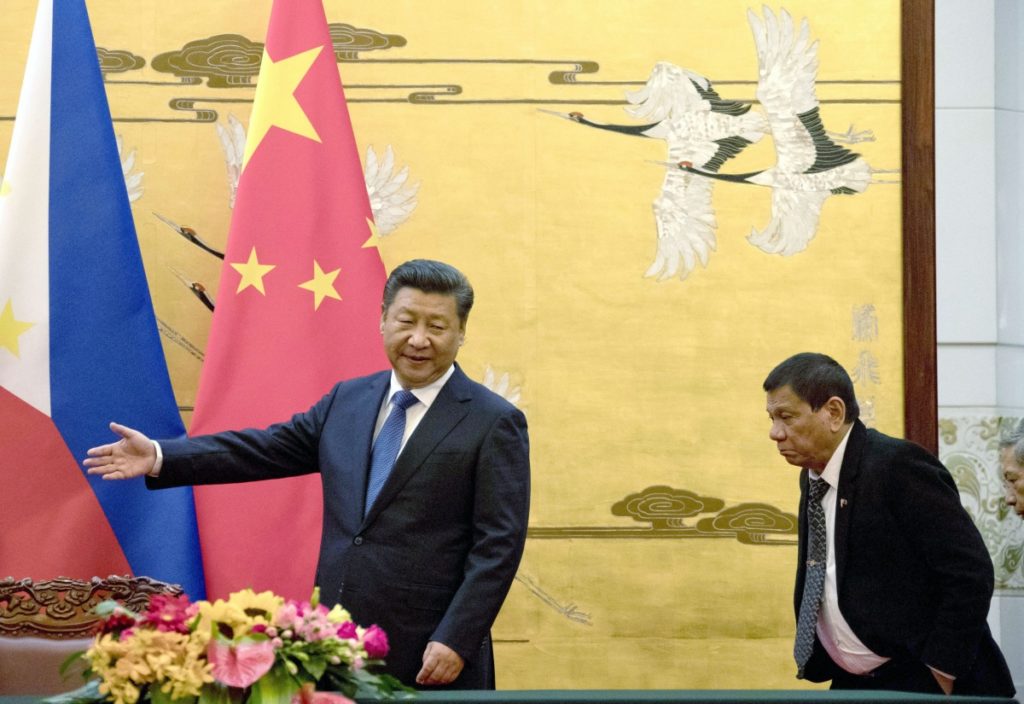
Chinese President Xi Jinping (left) shows the way to Rodrigo Duterte at a signing ceremony. (Associated Press)
In the past week China has seen potentially groundbreaking developments in internal and external politics. The visit of incendiary Philippine president Rodrigo Duterte could signal a shift in regional alliances. And the ruling Communist Party has looked to solidify its grip on power and support by showing its commitment to cracking down on government corruption.
On a state visit to Beijing on Oct. 20, 2016, President Duterte of the Philippines grabbed a lot of headlines on the international stage by declaring “a separation from the United States.” He also “repeatedly sought to distance the Philippines from the United States, a treaty ally.” Based on this and previous statements, some believe that Duterte intends to diminish his country’s long-standing military cooperation with the U.S.
But despite Duterte’s bluster, the extent to which he will actually go in breaking ties with one of its most important military partners is unknown (Jane Perlez of the New York Times characterized the Philippine army on its own as “underequipped and poorly trained”). For more on the potential military impact of Duterte’s threats and potential explanation for why he made them, you can read Gary Sands’ recent FPA blog post here.
In addition to rankling some officials in the U.S., Duterte’s visit could also signal a closer alliance between the Philippines and China. Such a shift could have major repercussions on the power balance in east Asia. On the same day as his “separation” comments, Duterte and Chinese Premier Xi Jinping agreed to resume negotiations over the disputed South China Sea. This prospect opens the door for de-escalation of hostilities in the hotly contested waterway, as well as a warming of relations between the 2 countries. But…very few details were offered on when the talks would start or what they would encompass.
Xi and Duterte did announce last Thursday that they would establish a joint coast guard committee on maritime cooperation. This could be an extremely important development as Chinese Coast Guard ships have been blocking Philippine boats from a key fishing area of the South China Sea after China claimed the area in 2012. China also pledged to assist the Philippines in developing aquaculture and commercial fish processing, issues previously highlighted by Duterte.
Beyond the South China Sea, Chinese leader Xi agreed to increase infrastructure investment in the Philippines by $24 billion, lift embargoes on certain food imports, and remove a travel advisory to try to encourage tourism exchange.
What’s more, other countries in the region are eyeing Duterte’s overtures towards China. As a result, some analysts believe neighboring Malaysia, Thailand, and Vietnam may begin to draw closer alliances with China. On Oct. 24, 2016, Perlez notes that “China may have started a strategic realignment in Southeast Asia by bringing an important American ally [the Philippines] to its side.”
However it is important to remember that Duterte’s shocking apparent success on his China visit does not ensure real cooperation. According to Trinh Nguyen, an economist specializing in the Asian Pacific region at Natixis Bank, “Pledges do not necessarily translate into realized foreign direct investment for the Philippines.” Certainly both sides saw the opportunity to gain political points at home and abroad on Duterte’s visit. Thus it appears the real-world, measurable impact of newly positive China-Philippines remains to be seen.
While China seeks new partnerships with its neighbors, the ruling Communist Party is renewing its efforts to stomp out political corruption at home. As Premier Xi begins a second five-year term, he has taken steps to show the Chinese people that graft and other illegal acts by government officials are not acceptable. The state-controlled TV station is even currently airing a documentary series showing disgraced former officials lamenting their bad choices and repenting their misdeeds. “I became possessed and lost my head,” says Bai Enpei, a former Communist Party secretary convicted of taking bribes of nearly $38 million.
The show details the lavish lifestyle of these officials—one of whom detailed his courtship by business executives with dinners featuring crocodile meat—as well as their falls from grace. Xi is presented as the hero swooping in to clean up the immoral acts, the only clean (literally and figuratively) party leader seen in the documentary.
Tighter control over the party will be reinforced this week at the Central Committee annual meeting. Premier Xi is expected to introduce new regulations regarding “comprehensive and strict management” of party affairs. This should expand on the power and influence of the Central Commission for Discipline Inspection, the anti-corruption task force headed by one of Xi’s closest allies. This group has recently begun to act with larger impunity as they aim to reinforce loyalty to the party and to Xi. It has the power to detain government officials in secret without needing court approval.
Are more countries in Asia setting in motion a shift in alliances away from the west and towards China? It is really too early to tell. But it will be important to monitor developments, and to see how far Duterte is really willing to go in alienating the Philippines from the U.S. All of his shocking commentary may end up being much ado about nothing. And while reducing corruption is never bad, the methods employed by the Chinese government are concerning.
Both situations will be worth watching.